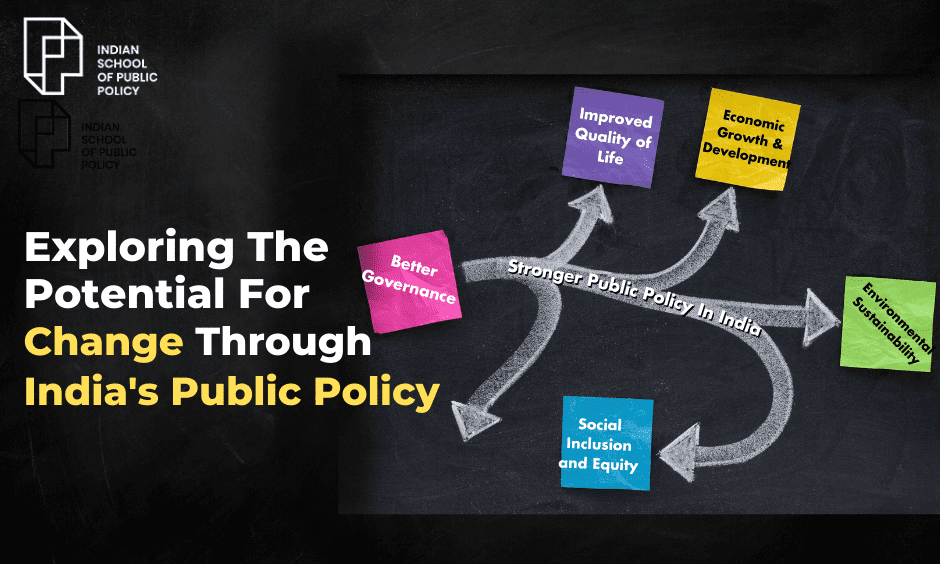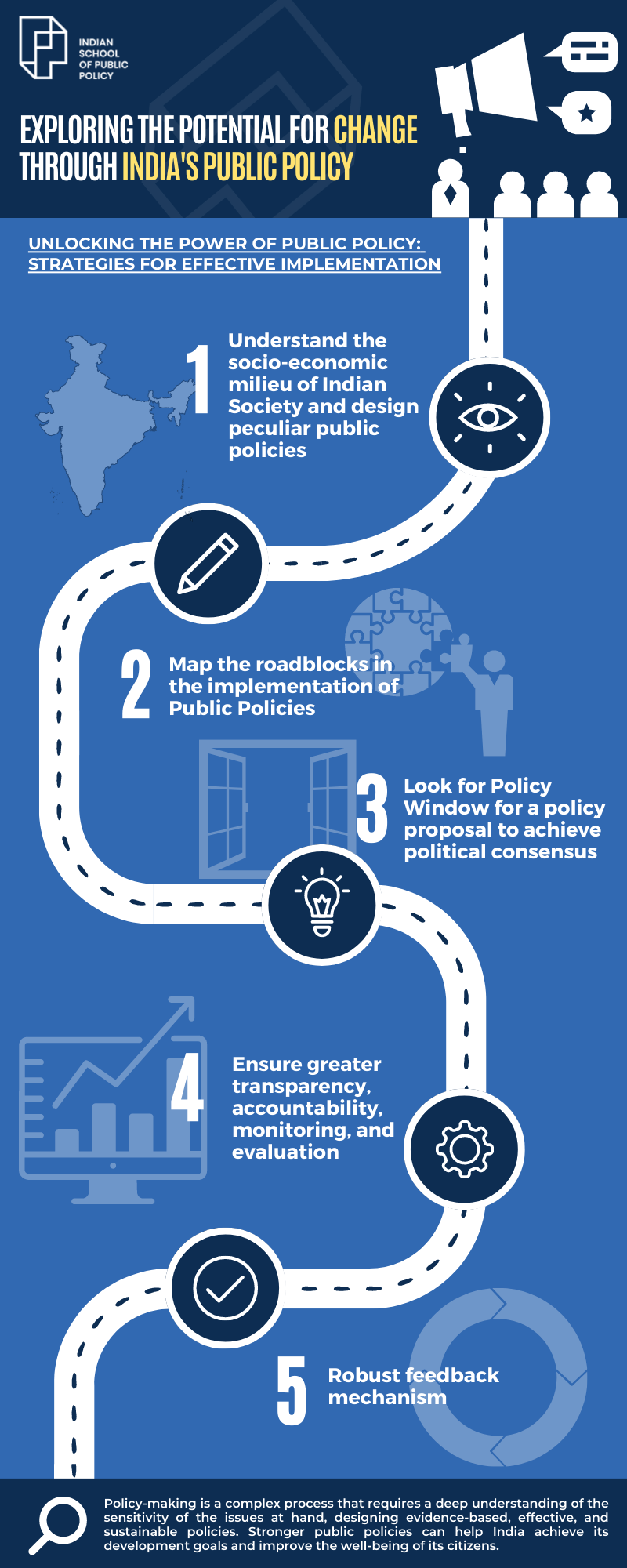
Exploring The Potential For Change Through India’s Public Policy

The Indian Constitution lays down the framework for public policy, which the government implements at various levels – central, state, and local. The policy-making process in India involves extensive participation of stakeholders, including civil society organizations, experts, and the public at large. In recent years, there has been a growing emphasis on evidence-based policy-making, focusing on data-driven solutions to complex problems.
The scope of public policy in India is vast and diverse, encompassing and addressing various challenges the country faces, such as social welfare, economic development, foreign affairs, education, health, environment, defence, and others. It also includes the formulation of laws and regulations, as well as the implementation of programs and schemes aimed at achieving specific goals. One of the major challenges for public policy in India is the need to balance competing demands and interests, such as economic growth versus environmental sustainability or national security versus individual freedoms. Ensuring effective implementation of policies, given the diversity and complexity of the country, is another challenge.
Let’s study the country’s complexities and challenges before exploring the potential of public policies for change.
Challenges
India faces numerous challenges while implementing public policy. Some of the key challenges are –
Implementation Gap – One of the major challenges in India is the gap between policy formulation and implementation. There exists extreme fragmentation in the structure. Often, policies are not implemented as intended or take much longer to be implemented, leading to delays and inefficiencies. This often results in sub-optimal policies that lack attention to the needs of the citizens.
Corruption and Bureaucratic Hurdles – Corruption and bureaucratic hurdles are some of the significant challenges policymakers face in India. Corruption in government agencies and bureaucratic red tape can slow down the implementation process, leading to delays and increased costs.
Paucity of Resources – India is a developing country, and limited resources are always a challenge for policymakers. Due to budgetary constraints, there is always a trade-off between different policies and their implementation.
Lack of Political Consensus – Political consensus is critical for the effective implementation of public policy. In India, political polarization and a lack of agreement among political parties can often hinder the implementation of policies.
Diversity and Complexity – India is a diverse and complex country with different cultures, languages, and socio-economic backgrounds. This diversity can pose several challenges for policymakers as policies that work in one region or community may not work in another.
Lack of Accountability and Monitoring – Lack of accountability and monitoring is another challenge in India. Often, there is no clear mechanism for monitoring policy implementation or holding policymakers accountable for their actions, leading to inefficiencies and corruption. A dynamic monitoring mechanism that uses technology could be built into various flagship programs initiated by the present government.
Infrastructure Deficit – The infrastructure deficit is a significant challenge in India. The lack of proper infrastructure can hinder the effective implementation of policies, particularly in rural areas.
Study India’s complexities and challenges while implementing public policy.
Benefits of Stronger Policies
Professionals have a critical role in designing more robust public policies for India. Policy-making is a complex process that requires a deep understanding of the sensitivity of the issues at hand, designing evidence-based, effective, and sustainable policies, the context in which the new policies are being implemented, and measuring their impacts. Effective policy development demands careful analysis of different options, drawing on available evidence. Moreover, designing and implementing public policies require a range of skills that can help ensure that the efficient implementation of policies reaches the intended beneficiaries.
Designing and implementing stronger public policies can transform India in the following ways –
Improved Quality of Life – Stronger public policies can help improve the quality of life for citizens by addressing their needs and concerns. This could include policies related to education, healthcare, and infrastructure development, among others.
Economic Growth and Development – Effective public policies can drive economic growth and development by creating an enabling environment for businesses to thrive. This could include policies related to investment, trade, and infrastructure development.
Better Governance – Strong public policies can lead to better governance by promoting transparency, accountability, and citizen participation in decision-making processes. This can help reduce corruption, improve public trust in government, and enhance the effectiveness of government policies.
Social Inclusion and Equity – Public policies can promote social inclusion and equity by ensuring that marginalized communities are not left behind. This could include policies related to affirmative action, social welfare programs, and human rights.
Environmental Sustainability – Public policies can play a critical role in promoting environmental sustainability by encouraging the adoption of environmentally friendly practices and technologies. This could include policies related to renewable energy, waste management, and climate change mitigation.
Stronger public policies can help India achieve its development goals and improve the well-being of its citizens.
Register your Interest to Study at ISPP
Post Graduate Programme In Public Policy Offered By The Indian School Of Public Policy
ISPP stands for the Indian School of Public Policy, a private institution that provides postgraduate programs in public policy. The school is located in New Delhi, India, and was established in 2018 with the aim of addressing the gap in quality public policy education in India. The Indian School of Public Policy equips students with the knowledge and skills to become effective policy professionals in government, civil society, or the private sector.
The Post Graduate Programme in Public Policy (PGP) offered by the Indian School of Public Policy (ISPP) is a highly respected and comprehensive program that prepares students for a career in public policy. The program is designed to equip students with the knowledge, skills, and values required to become the effective government, civil society, or private sector policy professionals. The curriculum is interdisciplinary, covering a wide range of topics related to public policy, including economics, political science, law, management, and data analysis. The program is structured around three trimesters, each with a specific focus, and includes a mix of classroom learning, case studies, workshops, and field visits. Students also have the opportunity to engage with policymakers, practitioners, and experts in the field through guest lectures, internships, and other co-curricular activities.
Admission Criteria
The admission criteria for the PGP at ISPP include –
- A bachelor’s degree from a recognized university,
- Work experience of at least two years
- A valid score on an entrance exam.
- Candidates must submit a statement of purpose, letters of recommendation, and transcripts of their academic records.
Faculty
The faculty at ISPP is composed of leading scholars, policymakers, and practitioners in the field of public policy. They bring a wealth of experience and expertise to the classroom, and students benefit from their insights and guidance.
Industry Connect
The PGP at ISPP has a strong industry connection, with partnerships with various organizations and government bodies. This allows students to gain practical exposure to policy-making and understand policy decisions’ real-world implications.
Career Opportunities
The PGP at ISPP prepares students for a range of careers in public policy, including roles in government, civil society, think tanks, and the private sector. The school has a dedicated career services team that supports students in their job search and networking efforts.
The PGP at ISPP is a highly valued program that prepares students to make meaningful contributions to the field of public policy and governance in India.
FAQs
What is the scope of public policy in India?
India has vast and diverse scope for public policy, encompassing and addressing various challenges faced by the country such as social welfare, economic development, foreign affairs, education, health, environment, defence, and others. The scope also includes the formulation of laws and regulations, as well as the implementation of programs and schemes aimed at achieving specific goals.
What are the challenges that India faces while implementing public policy?
Some of the key challenges are –
- Implementation Gap
- Corruption and Bureaucratic Hurdles
- Limited Resources
- Lack of Political Consensus
- Diversity and Complexity
- Lack of Accountability and Monitoring
- Infrastructure Deficit
What are the benefits of having stronger public policies in India?
Designing and implementing stronger public policies can transform India in the following ways –
- Improved Quality of Life
- Economic Growth and Development
- Better Governance
- Social Inclusion and Equity
- Environmental Sustainability
How is ISPP contributing to transforming India through stronger public policies?
The Post Graduate Programme in Public Policy (PGP) offered by the Indian School of Public Policy (ISPP) is a highly respected and comprehensive program that prepares students for a career in public policy. The program is designed to equip students with the knowledge, skills, and values required to become effective policy professionals in government, civil society, or the private sector. The curriculum is interdisciplinary, covering a wide range of topics related to public policy, including economics, political science, law, management, and data analysis. The program is structured around three trimesters, each with a specific focus, and includes a mix of classroom learning, case studies, workshops, and field visits. Students also have the opportunity to engage with policymakers, practitioners, and experts in the field through guest lectures, internships, and other co-curricular activities.
What do I need to know before enrolling for ISPP’s PGP?
The Post Graduate Programme in Public Policy (PGP) offered by the Indian School of Public Policy (ISPP) is designed to equip students with the knowledge, skills, and values required to become effective policy professionals in government, civil society, or the private sector.
Admission Criteria
The admission criteria for the PGP at ISPP include –
- A bachelor’s degree from a recognized university,
- Work experience of at least two years
- A valid score on an entrance exam.
- Candidates must submit a statement of purpose, letters of recommendation, and transcripts of their academic records.
Faculty
The faculty at ISPP is composed of leading scholars, policymakers, and practitioners in the field of public policy. They bring a wealth of experience and expertise to the classroom, and students benefit from their insights and guidance.
Industry Connect
The PGP at ISPP has a strong industry connection, with partnerships with various organizations and government bodies. This allows students to gain practical exposure to the policy-making process and understand the real-world implications of policy decisions.
Career Opportunities
The PGP at ISPP prepares students for a range of careers in the field of public policy, including roles in government, civil society, think tanks, and the private sector. The school has a dedicated career services team that provides support to students in their job search and networking efforts.
Check Infographics



